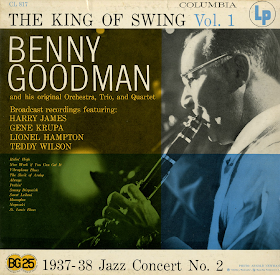Nagasaki
The King Of Swing
Volume 1
Benny Goodman
1937 - 38 Jazz Concert No. 2
Columbia Records CL 817
Benny Goodman - Clarinet
Harry James, Ziggy Elman, Chris Giffin - Trumpets
Red Ballard, Murray MacEachern - Trombones
Hymie Shertzer, George Koenig - Alto Saxophones
Art Rollini, Vido Musso - Tenor Saxophones
Jess Stacy - Piano
Allan Reuss - Guitar
Harry Goodman - Bass
Gene Krupa - Drums
Trio and Quartet: Benny Goodman (clarinet); Teddy Wilson (piano); Gene Krupa (drums); Lionel Hampton (vibraphone) added for Quartet
From the back cover: The fantastic success of the Benny Goodman Carnegie Hall Jazz Concert album (issued by Columbia in 1950, twelve and a half years after the epochal event took place in the unsuspected but fortunate presence of a first-class recording machine) was one of those things which Columbia – and Benny Goodman – figured could happen only once in a lifetime.
We hardly expected that it would happen again.
But it did.
This is it. And it's even better
This is the same all-star Goodman Trio, Quartet, and Orchestra – Harry James, Lionel Hampton, Gene Krupa Teddy Wilson, Ziggy Elman, Jess Stacy, Chris Griffin and all the rest of the great musicians who helped Benny make "swing" a household word in the thirties.
They play with the same fire and abandon which characterized the Carnegie Hall album, and they're inspired by the applause and cheers of the same fans, who worshipped them as jitterbugs and bobby-soxers have never idolized any other band before or since.
But this time the music was accurately balanced for the microphone by radio engineers, for these recordings are made from "air-checks" of late evening broadcasts from all over the country. Most of the original discs were taken off the air by a fan named Bill Savory, a Columbia Records engineer, who also did the remarkable editing job which produced these final master tapes. The final result is the most authentic original-Goodman sound ever captured on record, whether the band was broadcasting from the Manhattan Room of the Hotel Pennsylvanian or the Palomar in Lost Angeles.
Because the band kept up its broadcasts while on tour in 1937, it's now possible for a Goodman fan to enjoy the unique experience of going "on the road" with the band and hearing how it played in an ever-changing environment – an experience I almost had myself that summer after spending much of my senior year at the Horace Mann School for Boys hanging around Benny's band as a favored friend of Benny's backstage major domo, Dwight Chapin.
The broadcasts gave us another advantage not possible in the case of the Carnegie Hall album. We frequently had six or seven versions of the same tune to choose from, so that there was no need to put up with flagging inspiration or minor flaws. In brief, these air-checks have made it possible for Columbia to gather together the absolute cream of the greatest swing band in jazz history, caught at its very peak.
This treat is wonderful in itself, but there are also ramifications that bring it to the level of the collector's happy-hunting ground. Included in the three volumes which make up the complete set, are no less than 15 selections which Benny has never been identified with on recordings in any form up until now. (In the Carnegie Hall album, wonderful as it was, Goodman performed only repertoire which he had also recorded commercially.) In five other instances, the form in which a selection appears in this album is quite different from that in which Benny has recorded the same number – for example, Benny once recorded Someday Sweetheart with his Trio, but here it's played by the full band.
Among these 20 "new" Goodman numbers, there are performances of tunes that Benny himself hadn't remembered playing – numbers like Have You Met Miss Jones and Sweet Leilani which have since become standards, but were then current pops which Benny included on a broadcast because he happened to like them better than the ordinary pops which song-pluggers were after him to put on the air. There are even two on-the-spot improvisations by the Quartet for which the radio announcer gave no titles, so – fifteen years later – we had to think up names for them: Benny Sent Me and Killer Diller. (The latter is a term Benny picked up form one of his ace arrangers, Jimmy Mundy, who used it to describe a powerhouse swing performance on a fast tune. If you're under 21, ask Mom or Pop – they remember.) - George Avakian
Ridin' High
Nice Work If You Can Get It
Vibraphone Blues
The Sheik Of Araby
Always
Peckin'
Sunny Disposish
Sweet Leilani
Moonglow
Nagasaki
St. Louis Blues

No comments:
Post a Comment
Howdy! Thanks for leaving your thoughts!